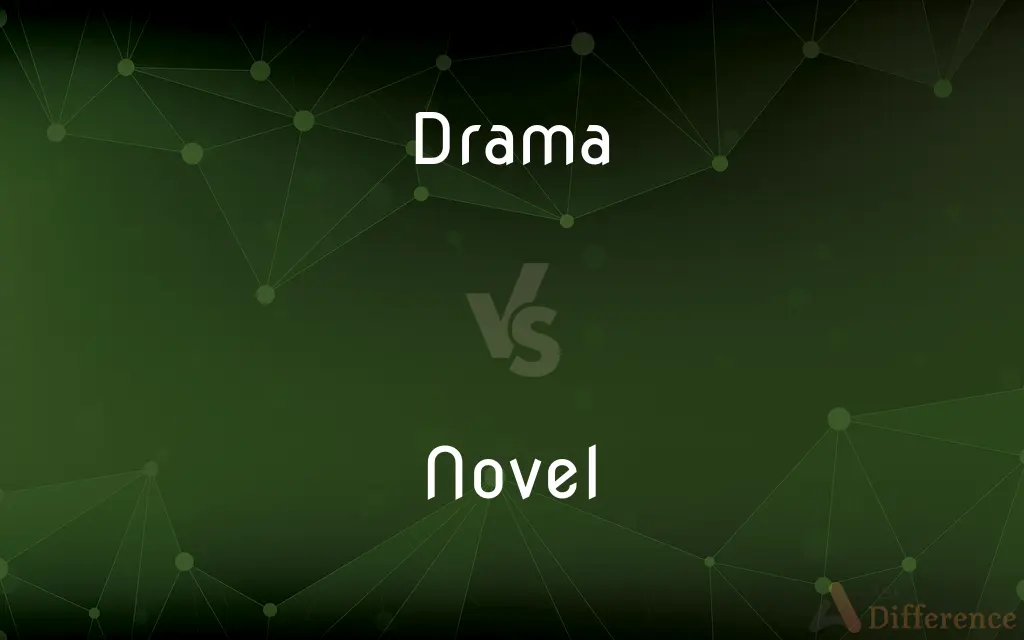Drama vs. Novel — What's the Difference?
By Tayyaba Rehman & Maham Liaqat — Updated on April 18, 2024
Drama is a performance art, staged in front of a live audience, focusing on dialogue and action; novels are lengthy written works, offering deep narrative and character development.

Difference Between Drama and Novel
Table of Contents
ADVERTISEMENT
Key Differences
Drama primarily unfolds through direct dialogue and stage directions intended for performance, capturing the immediacy of live action. Novels, on the other hand, explore internal monologues and detailed descriptions that build intricate worlds and psychological depth.
In drama, the audience's engagement is often real-time, with actors conveying the story through speech and physical expression, while novels engage readers through immersive reading, allowing for reflection and re-interpretation.
The structure of a drama is typically constrained by the physical and temporal limits of a stage and performance duration, whereas novels can span various timelines and settings, unrestricted by such boundaries.
Dramas rely heavily on collaboration among playwrights, directors, actors, and other theatre staff to bring the script to life, whereas novel writing is usually a solitary endeavor, with the author holding primary creative control.
The emotional impact in drama is often immediate, given the live interaction between the performers and the audience, while in novels, emotional depth is achieved through extended engagement with the text and its characters.
ADVERTISEMENT
Comparison Chart
Medium
Performance art
Written narrative
Engagement
Live audience, real-time
Individual reading, at reader's pace
Expression
Dialogue and physical action
Descriptive text, internal monologue
Structure
Limited by stage and performance time
Flexible, can cover various times and places
Creation Process
Collaborative (playwrights, actors, directors)
Solitary (author)
Compare with Definitions
Drama
A play for radio, television, or film.
The new drama series is set to air this fall.
Novel
Any book of a fictitious nature.
I spent the weekend reading a fascinating novel.
Drama
The quality of being dramatic.
The sunset gave a drama to the landscape.
Novel
Original or striking especially in conception or style.
His approach to science is novel in its interdisciplinary focus.
Drama
A genre of performance art presented on stage by actors.
Shakespeare’s Hamlet is a classic example of drama.
Novel
A lengthy fictional narrative in prose, usually having a plot that unfolds through the actions, speech, and thoughts of the characters.
Her latest novel explores themes of identity and migration.
Drama
Any situation or series of events having vivid, emotional, conflicting, or striking interest.
Their courtship was filled with drama.
Novel
A literary genre that focuses on character development and a sequential storyline.
Novels often provide a deeper insight into human emotions.
Drama
A composition in prose or verse presenting a story involving conflicts or contrast of character.
The school staged a drama about historical figures.
Novel
New and not resembling something formerly known or used.
Innovative companies often seek novel solutions to old problems.
Drama
Drama is the specific mode of fiction represented in performance: a play, opera, mime, ballet, etc., performed in a theatre, or on radio or television. Considered as a genre of poetry in general, the dramatic mode has been contrasted with the epic and the lyrical modes ever since Aristotle's Poetics (c.
Novel
A novel is a relatively long work of narrative fiction, typically written in prose and published as a book. The present English word for a long work of prose fiction derives from the Italian: novella for "new", "news", or "short story of something new", itself from the Latin: novella, a singular noun use of the neuter plural of novellus, diminutive of novus, meaning "new".Some novelists, including Nathaniel Hawthorne, Herman Melville, Ann Radcliffe, John Cowper Powys, preferred the term "romance" to describe their novels.
Drama
A play for theatre, radio, or television
A gritty urban drama about growing up in Harlem
Novel
A fictional prose narrative of considerable length, typically having a plot that is unfolded by the actions, speech, and thoughts of the characters.
Drama
An exciting, emotional, or unexpected event or circumstance
A hostage drama
An afternoon of high drama at Wembley
Novel
The literary genre represented by novels.
Drama
A prose or verse composition, especially one telling a serious story, that is intended for representation by actors impersonating the characters and performing the dialogue and action.
Novel
Strikingly new, unusual, or different.
Drama
A serious narrative work or program for television, radio, or the cinema.
Novel
Newly made, formed or evolved; having no precedent; of recent origin; new.
Drama
Theatrical plays of a particular kind or period
Elizabethan drama.
Novel
Original, especially in an interesting way; new and striking; not of the typical or ordinary type.
Drama
The art or practice of writing or producing dramatic works.
Novel
A work of prose fiction, longer than a novella.
Drama
A situation or succession of events in real life having the dramatic progression or emotional effect characteristic of a play
The drama of the prisoner's escape and recapture.
Novel
(historical) A fable; a short tale, especially one of many making up a larger work.
Drama
The quality or condition of being dramatic
A summit meeting full of drama.
Novel
(obsolete) A novelty; something new.
Drama
A composition, normally in prose, telling a story and intended to be represented by actors impersonating the characters and speaking the dialogue
The author released her latest drama, which became a best-seller.
Novel
A new legal constitution in ancient Rome.
Drama
Such a work for television, radio or the cinema (usually one that is not a comedy)
Novel
Of recent origin or introduction; not ancient; new; hence, out of the ordinary course; unusual; strange; surprising.
Drama
Theatrical plays in general
Novel
That which is new or unusual; a novelty.
Drama
A situation in real life that has the characteristics of such a theatrical play
After losing my job, having a car crash, and the big row with my neighbours, I don't need any more drama.
Novel
News; fresh tidings.
Some came of curiosity to hear some novels.
Drama
(slang) Rumor, lying or exaggerated reaction to life or online events; melodrama; an angry dispute or scene; a situation made more complicated or worse than it should be; intrigue or spiteful interpersonal maneuvering.
Novel
A fictitious tale or narrative, longer than a short story, having some degree of complexity and development of characters; it is usually organized as a time sequence of events, and is commonly intended to exhibit the operation of the passions, and often of love.
Drama
A composition, in prose or poetry, accommodated to action, and intended to exhibit a picture of human life, or to depict a series of grave or humorous actions of more than ordinary interest, tending toward some striking result. It is commonly designed to be spoken and represented by actors on the stage.
A divine pastoral drama in the Song of Solomon.
Novel
A extended fictional work in prose; usually in the form of a story
Drama
A series of real events invested with a dramatic unity and interest.
Westward the course of empire takes its way;The four first acts already past,A fifth shall close the drama with the day;Time's noblest offspring is the last.
The drama and contrivances of God's providence.
Novel
A printed and bound book that is an extended work of fiction;
His bookcases were filled with nothing but novels
He burned all the novels
Drama
Dramatic composition and the literature pertaining to or illustrating it; dramatic literature.
Novel
Of a kind not seen before;
The computer produced a completely novel proof of a well-known theorem
Drama
A dramatic work intended for performance by actors on a stage;
He wrote several plays but only one was produced on Broadway
Novel
Pleasantly novel or different;
Common sense of a most refreshing sort
Drama
An episode that is turbulent or highly emotional
Drama
The literary genre of works intended for the theater
Drama
The quality of being arresting or highly emotional
Common Curiosities
How does time manipulation differ between dramas and novels?
Novels can manipulate time more freely through flashbacks and nonlinear narratives, while dramas may find manipulating time challenging without confusing the live audience.
What is the typical length of a drama compared to a novel?
Dramas are usually concise, often completed in one to three hours of performance time, while novels can span hundreds of pages and require several hours to read.
Can the same themes be explored effectively in both dramas and novels?
Yes, both mediums can explore similar themes (like love, conflict, and betrayal), but the methods and depth of exploration will differ due to the nature of each medium.
What makes a drama successful compared to a novel?
Success in drama often hinges on the effectiveness of the performance and immediate audience reception, whereas a novel's success can be measured by long-term readership and critical acclaim.
Are there specific structural formats that dramas and novels follow?
Dramas typically follow a structured act format (e.g., three-act structure), while novels may follow various structures such as chapters, parts, or an episodic format.
How do settings differ in dramas and novels?
Dramas often feature limited settings due to stage constraints, while novels can explore multiple, expansive settings as they are not limited by physical space.
What role does audience play in dramas versus novels?
In dramas, the audience plays an active role by reacting directly to the performance, which can influence the presentation. In novels, readers interact with the text internally and individually.
What are the challenges of translating a novel into a drama and vice versa?
Translating a novel into a drama often involves condensing the story and focusing on dialogues and visible actions, while adapting a drama into a novel might require expanding the narrative and developing the internal states of characters.
How do authors convey characters’ thoughts in novels and dramas?
In novels, authors often use internal monologue to express characters' thoughts, whereas in dramas, thoughts must be inferred from dialogue and actions or occasionally through direct addresses to the audience.
What are the main economic considerations for producing a drama compared to publishing a novel?
Producing a drama typically requires more upfront investment in cast, crew, and staging, whereas publishing a novel mainly involves writing, editing, and printing costs.
How are dramas and novels adapted for modern consumption?
Dramas are adapted into films, television shows, or even online streaming formats, while novels might be adapted into various media formats including films, TV series, and even video games.
What skills are primarily needed to create a drama compared to a novel?
Drama creation often requires skills in dialogue writing and understanding of visual storytelling and stage dynamics, while novel writing demands a strong grasp of narrative structure, descriptive prowess, and character development.
How do historical contexts influence dramas and novels?
Both are influenced by their historical contexts, but dramas often reflect the immediate cultural and social norms more distinctly since they are performed and consumed publicly and contemporaneously.
How do the pacing and tension differ between dramas and novels?
Dramas often have a faster pacing due to time constraints of performance, focusing on immediate tension and resolution, whereas novels may develop tension more slowly and delve deeper into complex narratives.
How do modern technologies influence the production of dramas and the publication of novels?
Technologies such as digital streaming have opened new platforms for dramas, enhancing accessibility and experimental storytelling. For novels, e-books and online publishing have broadened readership and diversified the ways stories are consumed and distributed.
Share Your Discovery

Previous Comparison
Cell vs. Tissue
Next Comparison
Aluminium vs. TinAuthor Spotlight
Written by
Tayyaba RehmanTayyaba Rehman is a distinguished writer, currently serving as a primary contributor to askdifference.com. As a researcher in semantics and etymology, Tayyaba's passion for the complexity of languages and their distinctions has found a perfect home on the platform. Tayyaba delves into the intricacies of language, distinguishing between commonly confused words and phrases, thereby providing clarity for readers worldwide.
Co-written by
Maham Liaqat















































